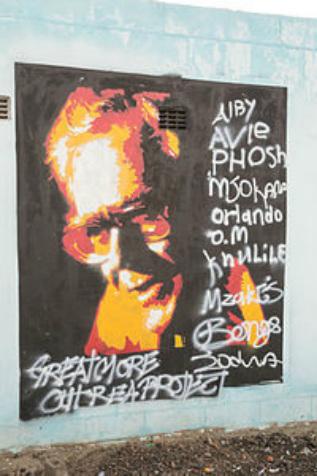Not at all? OK.
Now go back to the ‘70s, ‘80s and ‘90s. You heard it a lot. And the people who thought that, and said that, are still around. They are just keeping quiet. Believe me, these right-wing racists are still thinking the same things, even if they are not saying them out loud.
In the ‘60s, Mandela and the ANC were the litmus test of a Dreyfusard, Claud Cockburn’s definition of someone who would be on the right side of history regardless of his or her party political allegiance. For a just-about-post-imperialist Britain, the apartheid regime in South Africa divided people in a quite extraordinary way. Many of my friends at university were white South Africans who had been expelled from their country for their political views. There were, of course, very few black South Africans at Cambridge at that time.
But that made the espousal of the cause even more crucial. And it was focussed on the Stop The Seventy Tour protests of 1969 and 1970. The great John Arlott once said that if one placed a bomb in the grandstand of Twickenham on international day, one would destroy fascism in England for a generation.
So there was a number of objectives in the STST campaign: to disrupt the Springbok tour, to ensure that the cricket tour of that summer was cancelled, and also to make the point to the supporters of the regime in South Africa.
It worked. And it was the beginning of a campaign which, ultimately and far too late, culminated in the release of Madiva and the first democratic elections, in which Jill’s parents proudly voted for the ANC. In the meantime, Jill and I had attended Mandela’s 70th birthday concert at Wembley in June 1988 and cried our eyes out as we watched his release on TV 20 months later.
He was the symbol of the movement, the epitome of anti-apartheid. We know now a great deal about his imprisonment and his grace and commitment during those 27 years. But while he was in that cell as prisoner 466/64, there were others outside those confines who continued the struggle and without whom, Madiva may still be there.
I want to mention just two, because I was privileged to shake the hands of both.
The first is Joe Slovo, the General Secretary of the South African Communist Party. Jewish, communist, husband of Ruth First, and hated by the Afrikaans and the British establishment alike, he wrote No Middle Road, a book which helped to convince many liberals in the 1970s that apartheid could not be reformed or changed: it had to be abolished. Totally. Completely.
The second, of course, is Oliver Tambo, who lived in North London from the early ‘60s, as a kind of overseas ambassador for the ANC. He was tireless in this respect – a great speaker and a very funny, witty conversationalist. He was primarily responsible for the expulsion of South Africa from the Commonwealth, and for the international acceptance of the ANC as a government in waiting. A great man.
The success of the movement and the abolition of apartheid was not, of course, merely down to two or three men, however great they were. It was the result of millions, black and white, from South Africa and every continent, who perceived the injustice and contributed in however small a way to changing minds.
But not all minds and certainly not all hearts.
There are still those who have not changed. You will meet them in London clubs, in small Tory enclaves, at private dining clubs in the City and at dinner parties in Surrey and the Cotswolds. They will be surreptitious in their attitude and disingenuous in their argument. But you will know them by their innate bigotry which will manifest itself if challenged.
Watch out for them. And take them on. They are not required on this voyage.
Today from the everysmith vault: It's been a hell of a few days for music in Leamington, with a succession of excellent gigs throughout a long weekend. Highlights, for me: The Rosenberg Appeal on Friday at LAMP (these three deserve a great deal more recognition) and the terrific sets by the Swaps and Wes Finch & the Dirty Band at the Pump Rooms on Sunday.






 RSS Feed
RSS Feed